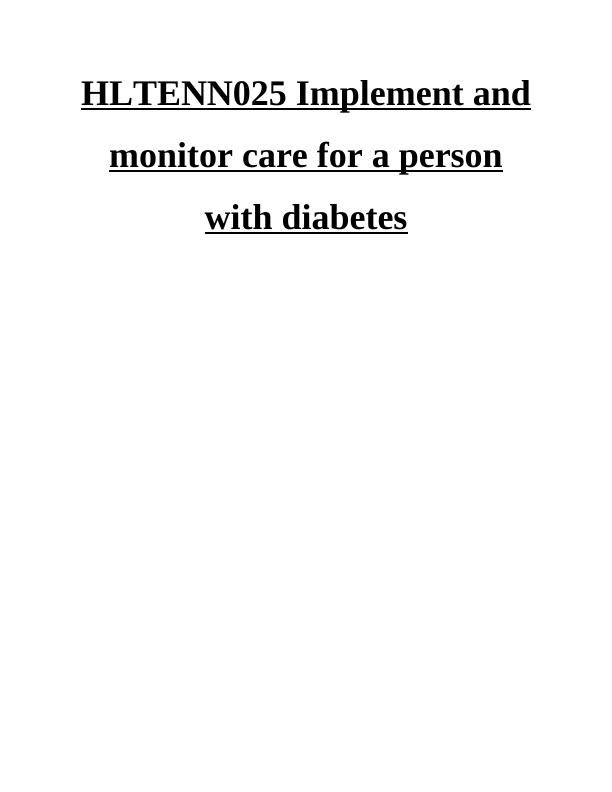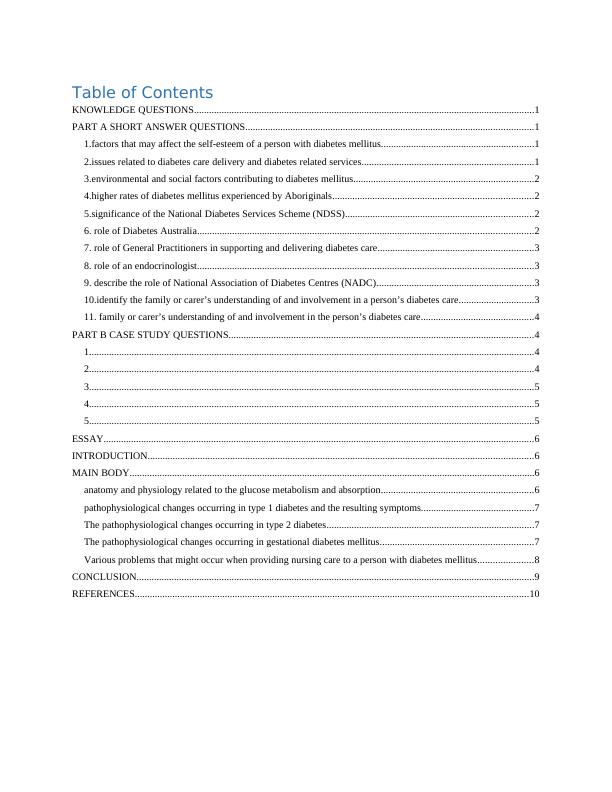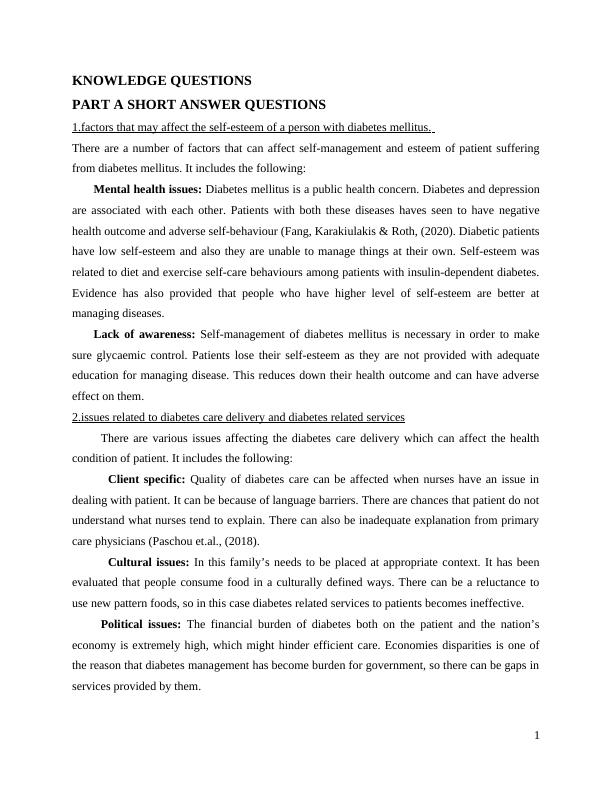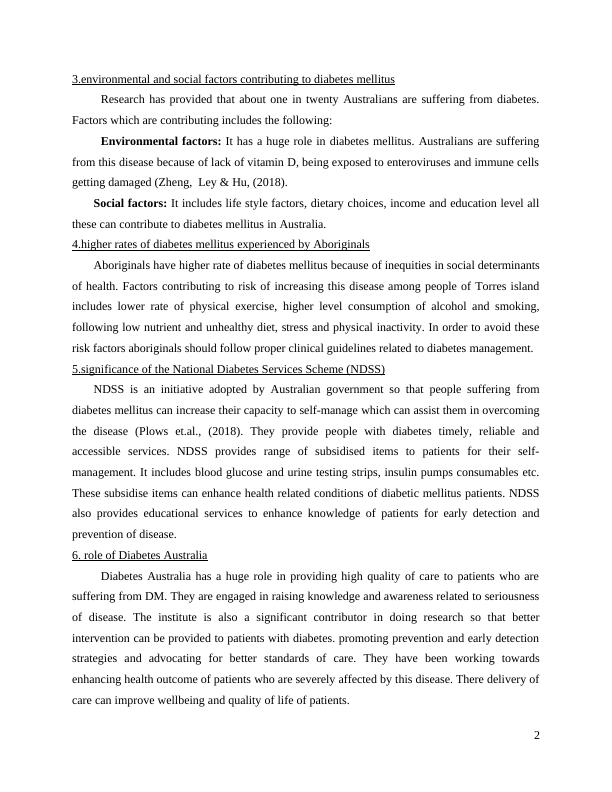Implement and Monitor Care for a Person with Diabetes
13 Pages4659 Words93 Views
Added on 2023-01-06
About This Document
This document provides knowledge and case study questions related to implementing and monitoring care for a person with diabetes. It covers factors affecting self-esteem, issues in diabetes care delivery, environmental and social factors contributing to diabetes, and the role of healthcare professionals. The document also includes a case study and nursing care plan for managing diabetes.
Implement and Monitor Care for a Person with Diabetes
Added on 2023-01-06
ShareRelated Documents
HLTENN025 Implement and
monitor care for a person
with diabetes
monitor care for a person
with diabetes

Table of Contents
KNOWLEDGE QUESTIONS........................................................................................................................................1
PART A SHORT ANSWER QUESTIONS...................................................................................................................1
1.factors that may affect the self-esteem of a person with diabetes mellitus.............................................................1
2.issues related to diabetes care delivery and diabetes related services.....................................................................1
3.environmental and social factors contributing to diabetes mellitus........................................................................2
4.higher rates of diabetes mellitus experienced by Aboriginals................................................................................2
5.significance of the National Diabetes Services Scheme (NDSS)...........................................................................2
6. role of Diabetes Australia......................................................................................................................................2
7. role of General Practitioners in supporting and delivering diabetes care..............................................................3
8. role of an endocrinologist......................................................................................................................................3
9. describe the role of National Association of Diabetes Centres (NADC)...............................................................3
10.identify the family or carer’s understanding of and involvement in a person’s diabetes care..............................3
11. family or carer’s understanding of and involvement in the person’s diabetes care.............................................4
PART B CASE STUDY QUESTIONS..........................................................................................................................4
1..................................................................................................................................................................................4
2..................................................................................................................................................................................4
3..................................................................................................................................................................................5
4..................................................................................................................................................................................5
5..................................................................................................................................................................................5
ESSAY............................................................................................................................................................................6
INTRODUCTION..........................................................................................................................................................6
MAIN BODY..................................................................................................................................................................6
anatomy and physiology related to the glucose metabolism and absorption.............................................................6
pathophysiological changes occurring in type 1 diabetes and the resulting symptoms.............................................7
The pathophysiological changes occurring in type 2 diabetes...................................................................................7
The pathophysiological changes occurring in gestational diabetes mellitus.............................................................7
Various problems that might occur when providing nursing care to a person with diabetes mellitus......................8
CONCLUSION...............................................................................................................................................................9
REFERENCES.............................................................................................................................................................10
KNOWLEDGE QUESTIONS........................................................................................................................................1
PART A SHORT ANSWER QUESTIONS...................................................................................................................1
1.factors that may affect the self-esteem of a person with diabetes mellitus.............................................................1
2.issues related to diabetes care delivery and diabetes related services.....................................................................1
3.environmental and social factors contributing to diabetes mellitus........................................................................2
4.higher rates of diabetes mellitus experienced by Aboriginals................................................................................2
5.significance of the National Diabetes Services Scheme (NDSS)...........................................................................2
6. role of Diabetes Australia......................................................................................................................................2
7. role of General Practitioners in supporting and delivering diabetes care..............................................................3
8. role of an endocrinologist......................................................................................................................................3
9. describe the role of National Association of Diabetes Centres (NADC)...............................................................3
10.identify the family or carer’s understanding of and involvement in a person’s diabetes care..............................3
11. family or carer’s understanding of and involvement in the person’s diabetes care.............................................4
PART B CASE STUDY QUESTIONS..........................................................................................................................4
1..................................................................................................................................................................................4
2..................................................................................................................................................................................4
3..................................................................................................................................................................................5
4..................................................................................................................................................................................5
5..................................................................................................................................................................................5
ESSAY............................................................................................................................................................................6
INTRODUCTION..........................................................................................................................................................6
MAIN BODY..................................................................................................................................................................6
anatomy and physiology related to the glucose metabolism and absorption.............................................................6
pathophysiological changes occurring in type 1 diabetes and the resulting symptoms.............................................7
The pathophysiological changes occurring in type 2 diabetes...................................................................................7
The pathophysiological changes occurring in gestational diabetes mellitus.............................................................7
Various problems that might occur when providing nursing care to a person with diabetes mellitus......................8
CONCLUSION...............................................................................................................................................................9
REFERENCES.............................................................................................................................................................10

KNOWLEDGE QUESTIONS
PART A SHORT ANSWER QUESTIONS
1.factors that may affect the self-esteem of a person with diabetes mellitus.
There are a number of factors that can affect self-management and esteem of patient suffering
from diabetes mellitus. It includes the following:
Mental health issues: Diabetes mellitus is a public health concern. Diabetes and depression
are associated with each other. Patients with both these diseases haves seen to have negative
health outcome and adverse self-behaviour (Fang, Karakiulakis & Roth, (2020). Diabetic patients
have low self-esteem and also they are unable to manage things at their own. Self-esteem was
related to diet and exercise self-care behaviours among patients with insulin-dependent diabetes.
Evidence has also provided that people who have higher level of self-esteem are better at
managing diseases.
Lack of awareness: Self-management of diabetes mellitus is necessary in order to make
sure glycaemic control. Patients lose their self-esteem as they are not provided with adequate
education for managing disease. This reduces down their health outcome and can have adverse
effect on them.
2.issues related to diabetes care delivery and diabetes related services
There are various issues affecting the diabetes care delivery which can affect the health
condition of patient. It includes the following:
Client specific: Quality of diabetes care can be affected when nurses have an issue in
dealing with patient. It can be because of language barriers. There are chances that patient do not
understand what nurses tend to explain. There can also be inadequate explanation from primary
care physicians (Paschou et.al., (2018).
Cultural issues: In this family’s needs to be placed at appropriate context. It has been
evaluated that people consume food in a culturally defined ways. There can be a reluctance to
use new pattern foods, so in this case diabetes related services to patients becomes ineffective.
Political issues: The financial burden of diabetes both on the patient and the nation’s
economy is extremely high, which might hinder efficient care. Economies disparities is one of
the reason that diabetes management has become burden for government, so there can be gaps in
services provided by them.
1
PART A SHORT ANSWER QUESTIONS
1.factors that may affect the self-esteem of a person with diabetes mellitus.
There are a number of factors that can affect self-management and esteem of patient suffering
from diabetes mellitus. It includes the following:
Mental health issues: Diabetes mellitus is a public health concern. Diabetes and depression
are associated with each other. Patients with both these diseases haves seen to have negative
health outcome and adverse self-behaviour (Fang, Karakiulakis & Roth, (2020). Diabetic patients
have low self-esteem and also they are unable to manage things at their own. Self-esteem was
related to diet and exercise self-care behaviours among patients with insulin-dependent diabetes.
Evidence has also provided that people who have higher level of self-esteem are better at
managing diseases.
Lack of awareness: Self-management of diabetes mellitus is necessary in order to make
sure glycaemic control. Patients lose their self-esteem as they are not provided with adequate
education for managing disease. This reduces down their health outcome and can have adverse
effect on them.
2.issues related to diabetes care delivery and diabetes related services
There are various issues affecting the diabetes care delivery which can affect the health
condition of patient. It includes the following:
Client specific: Quality of diabetes care can be affected when nurses have an issue in
dealing with patient. It can be because of language barriers. There are chances that patient do not
understand what nurses tend to explain. There can also be inadequate explanation from primary
care physicians (Paschou et.al., (2018).
Cultural issues: In this family’s needs to be placed at appropriate context. It has been
evaluated that people consume food in a culturally defined ways. There can be a reluctance to
use new pattern foods, so in this case diabetes related services to patients becomes ineffective.
Political issues: The financial burden of diabetes both on the patient and the nation’s
economy is extremely high, which might hinder efficient care. Economies disparities is one of
the reason that diabetes management has become burden for government, so there can be gaps in
services provided by them.
1

3.environmental and social factors contributing to diabetes mellitus
Research has provided that about one in twenty Australians are suffering from diabetes.
Factors which are contributing includes the following:
Environmental factors: It has a huge role in diabetes mellitus. Australians are suffering
from this disease because of lack of vitamin D, being exposed to enteroviruses and immune cells
getting damaged (Zheng, Ley & Hu, (2018).
Social factors: It includes life style factors, dietary choices, income and education level all
these can contribute to diabetes mellitus in Australia.
4.higher rates of diabetes mellitus experienced by Aboriginals
Aboriginals have higher rate of diabetes mellitus because of inequities in social determinants
of health. Factors contributing to risk of increasing this disease among people of Torres island
includes lower rate of physical exercise, higher level consumption of alcohol and smoking,
following low nutrient and unhealthy diet, stress and physical inactivity. In order to avoid these
risk factors aboriginals should follow proper clinical guidelines related to diabetes management.
5.significance of the National Diabetes Services Scheme (NDSS)
NDSS is an initiative adopted by Australian government so that people suffering from
diabetes mellitus can increase their capacity to self-manage which can assist them in overcoming
the disease (Plows et.al., (2018). They provide people with diabetes timely, reliable and
accessible services. NDSS provides range of subsidised items to patients for their self-
management. It includes blood glucose and urine testing strips, insulin pumps consumables etc.
These subsidise items can enhance health related conditions of diabetic mellitus patients. NDSS
also provides educational services to enhance knowledge of patients for early detection and
prevention of disease.
6. role of Diabetes Australia
Diabetes Australia has a huge role in providing high quality of care to patients who are
suffering from DM. They are engaged in raising knowledge and awareness related to seriousness
of disease. The institute is also a significant contributor in doing research so that better
intervention can be provided to patients with diabetes. promoting prevention and early detection
strategies and advocating for better standards of care. They have been working towards
enhancing health outcome of patients who are severely affected by this disease. There delivery of
care can improve wellbeing and quality of life of patients.
2
Research has provided that about one in twenty Australians are suffering from diabetes.
Factors which are contributing includes the following:
Environmental factors: It has a huge role in diabetes mellitus. Australians are suffering
from this disease because of lack of vitamin D, being exposed to enteroviruses and immune cells
getting damaged (Zheng, Ley & Hu, (2018).
Social factors: It includes life style factors, dietary choices, income and education level all
these can contribute to diabetes mellitus in Australia.
4.higher rates of diabetes mellitus experienced by Aboriginals
Aboriginals have higher rate of diabetes mellitus because of inequities in social determinants
of health. Factors contributing to risk of increasing this disease among people of Torres island
includes lower rate of physical exercise, higher level consumption of alcohol and smoking,
following low nutrient and unhealthy diet, stress and physical inactivity. In order to avoid these
risk factors aboriginals should follow proper clinical guidelines related to diabetes management.
5.significance of the National Diabetes Services Scheme (NDSS)
NDSS is an initiative adopted by Australian government so that people suffering from
diabetes mellitus can increase their capacity to self-manage which can assist them in overcoming
the disease (Plows et.al., (2018). They provide people with diabetes timely, reliable and
accessible services. NDSS provides range of subsidised items to patients for their self-
management. It includes blood glucose and urine testing strips, insulin pumps consumables etc.
These subsidise items can enhance health related conditions of diabetic mellitus patients. NDSS
also provides educational services to enhance knowledge of patients for early detection and
prevention of disease.
6. role of Diabetes Australia
Diabetes Australia has a huge role in providing high quality of care to patients who are
suffering from DM. They are engaged in raising knowledge and awareness related to seriousness
of disease. The institute is also a significant contributor in doing research so that better
intervention can be provided to patients with diabetes. promoting prevention and early detection
strategies and advocating for better standards of care. They have been working towards
enhancing health outcome of patients who are severely affected by this disease. There delivery of
care can improve wellbeing and quality of life of patients.
2

End of preview
Want to access all the pages? Upload your documents or become a member.
Related Documents
Factors Affecting Self Esteem and Diabetes Managementlg...
|8
|2581
|72
Factors Affecting Self Esteem in Diabetes Mellitus Patientslg...
|10
|3424
|76
Anatomy and Physiology of Diabetes Mellitus: A Comprehensive Overviewlg...
|18
|3872
|198
The Experience of Living with Diabetes Mellituslg...
|8
|2547
|43
Assignment on Patient Care - Introductionlg...
|17
|4561
|18
Health issues in Gerontologylg...
|10
|3000
|421
